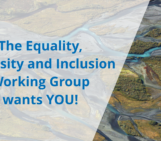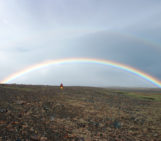
“Who are these men?!” he says, seeming genuinely baffled. I feel my shoulders rise towards my ears with tension as I wait for him to continue.
The man is summarizing what his group, comprised solely of men, have arrived at during their group-discussion at the gender equality seminar we are taking. We have been presented with, I might say, “the usual” statistics for academic women. A prevalence, certainly, of sexual harassment and hostile working environments, but specifically highlighted also is the excess of small, seemingly innocuous oversights, issues and hurdles, ultimately leading to the ever-present imposter syndrome.
I feel seen.
And yet, the spokesperson for the group continues his summary:
“We think there are some alpha-males.” He goes on at some length about these difficult men, and what solutions there might be to the problems they cause. I wish I could find my voice, but I am so frustrated that I feel there is a high chance my voice will break, and I will become the archetype of women – weak and emotional. I bite my tongue.
I want to find my voice. I want to stand up and say:
“You! You are these men. Every man in here is “these men.” We will get nowhere if none of you acknowledge your role!”
I am not angry with them. I like them, good colleagues, some even good friends. However, none of them is without any role in this. It is not a conscious choice they are making, but at the same time they are highlighting the very essence of the problem.
Most men do not think they are a part of the problem. Most probably feel they are a part of the solution.
Our workplace is male-dominated, by a landslide, and it is a work environment historically built on a male approach, however stereotypical that might sound.
Another voice pipes up to say:
“Why don’t these women talk to their superiors? Report these things?” I want to laugh.
We have all heard the expression ‘making a mountain of a molehill’. I cannot report a molehill.
I cannot go the management and have a meeting because I have, yet again, been left out of an email, forgotten for a meeting, added last to a list, not been invited to a lunch, not asked my opinion, not invited to co-supervise a master or PhD, left behind alone at the office on field-campaigns, not included in a research project in which I clearly have expertise, not cited by my own colleagues on highly relevant publications, not even asked to co-author a paper on a project where I am the lead expert but instead racing to find an equivalent male at a university nearby. Or perhaps the worst, tagged onto something at the last minute as the token woman without having an actual role. Included into meetings or in roles without any actual communication, guidance, input. Perhaps it is almost worse when you are included on paper, reduced to just your female name. No, I cannot report these molehills. And yet the molehills have become a mountain. I would not be sitting there, shoulders creeping up over my ears, if fifteen years of molehills were not weighing on my mind, if every statistic didn’t feel like a punch in the gut, and if this incomprehension of the systemic unintended bias in our workplace, didn’t feel like a cold slap in the face.
I have a close friend working in IT, and she says they can recruit women to her company, but not keep them. Her colleagues are concerned over this, and suggest that buying scented candles for the bathroom might make the work-environment more appealing. This more than anything feels endemic of the problem at hand. Men want gender equity, they want a better work-environment. But typically they want an action plan. A solution. Those scented candles are thinking “right”, but oh so wrong. I do not want candles. I want someone to provide an inclination that I have something to contribute. I do not want to force these men to include me, I want them to want to include me. However, I, like them, if I might be so bold, prefer to work with my own gender. If that option were available to me. I communicate better with women, I understand women, I connect with them. If the roles were reversed would I not predominantly build projects with friends? Supervise with friends? Travel to the field with friends? My friends typically being women.
Just as I cannot report the molehills I cannot stand up and point a finger. There is no macho chauvinistic male who has made me feel like this. In fact rather there have been kind, cheerful, helpful men around, who have been nothing of the sort. There is no one wrong. There is a world of inconveniences.
The statistics show women publishing less than men, getting fewer citations, fewer grants, fewer professorships. The discussions move on to how to change these numbers.
Change needs to happen, but it is a catch-22. We want to achieve gender equity and yet for gender equity to be achieved we need to keep women in academia, but women leave academia.
To keep women we need to include women, support women, but women do not want to be forced upon anyone, forcibly included in anything for the sake of upping the statistics. For me, more than anything, this is about inclusivity. I want a working environment in which I am included, valued, and trusted. I think it is important to stress that I want this much more than the measurable “success”. Change needs to happen, but more change than just scented candles in the bathroom.
I bite my tongue. What a “typically female” thing to do. Sit quietly.
I could kick myself.





Ann Robertson-Tait, Global Chair, Women in Geothermal
Ingrid, I experience the same thing. It is not overt or obvious, but the bias is there. And the things you describe as being subtle yet omnipresent are by far the most annoying of all. Friendliness and inclusivity are easy things to do – they cost us nothing – and we have much to gain from them. Wherever I go, I smile and talk to people who are complete strangers. I am honestly interested in them, what they do, what they like, what restaurant is good in their town, what places to avoid. They feel included, and so do I. I wonder why more people don’t do this – is it because they are shy? Uninterested in what someone else has to say? Afraid that they are showing a weakness (like asking for directions)? I don’t know. But your post hit the mark – each increment of being ignored (deliberately or unconsciously) contributes to frustration, when we have much bigger problems to solve. Acknowledging one another is easy and useful. Do it!